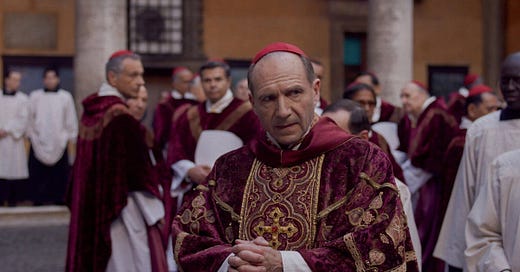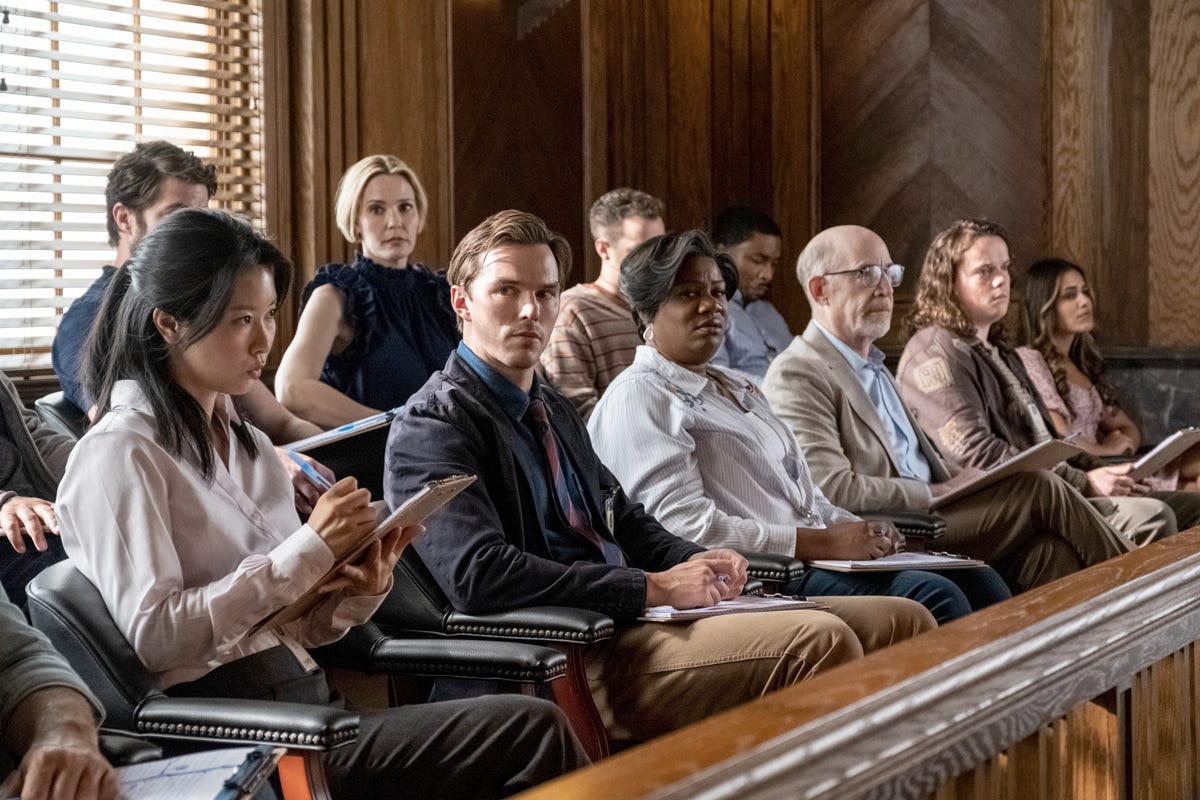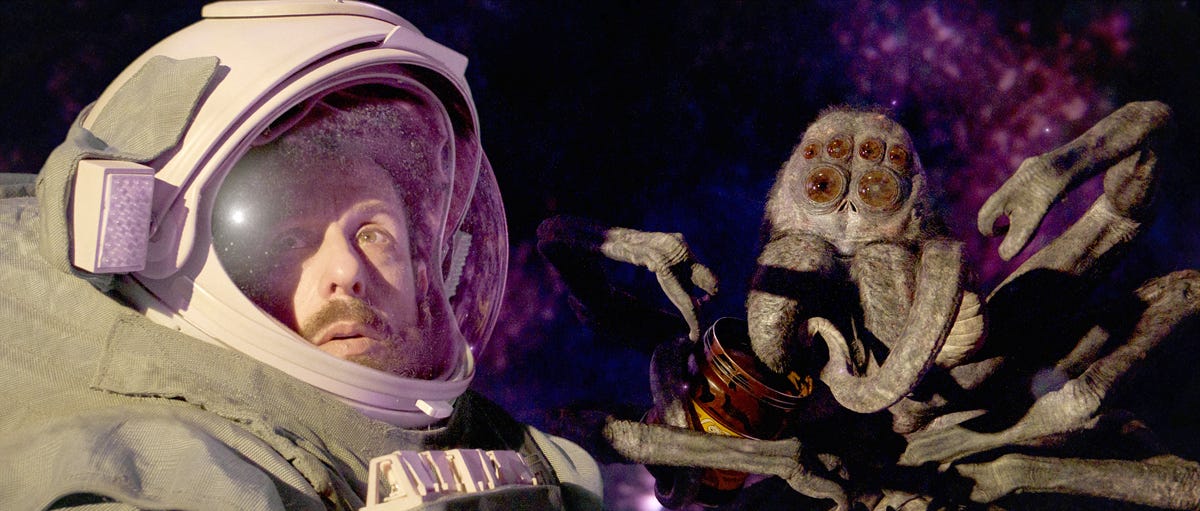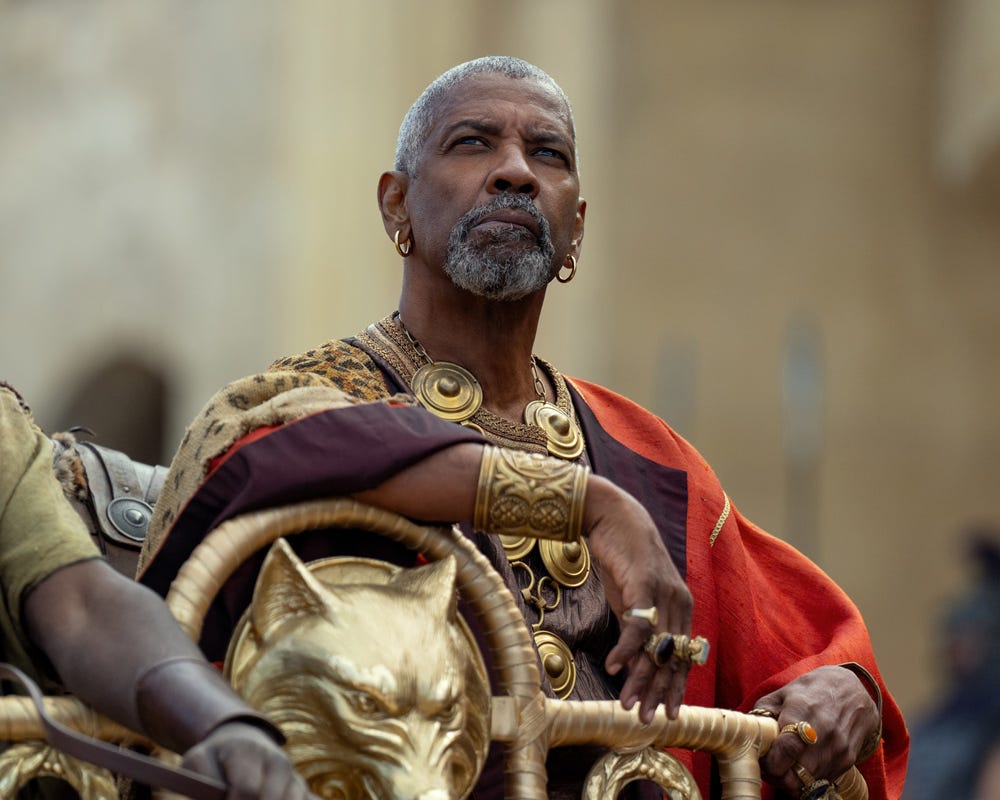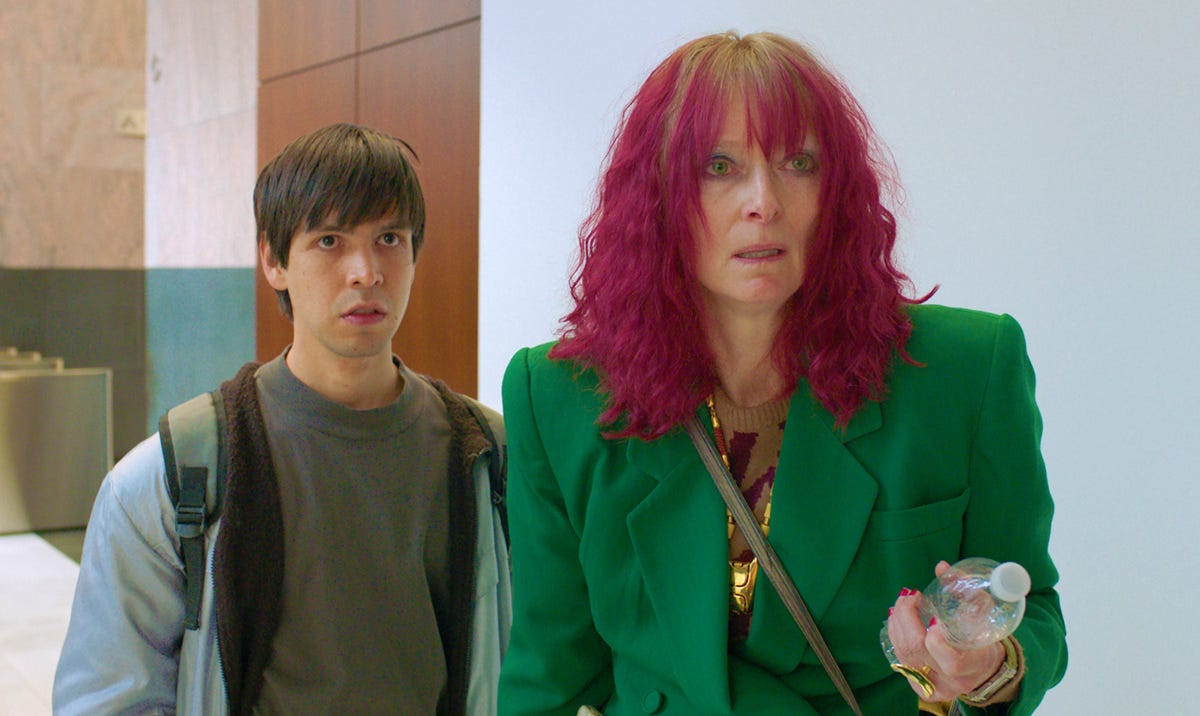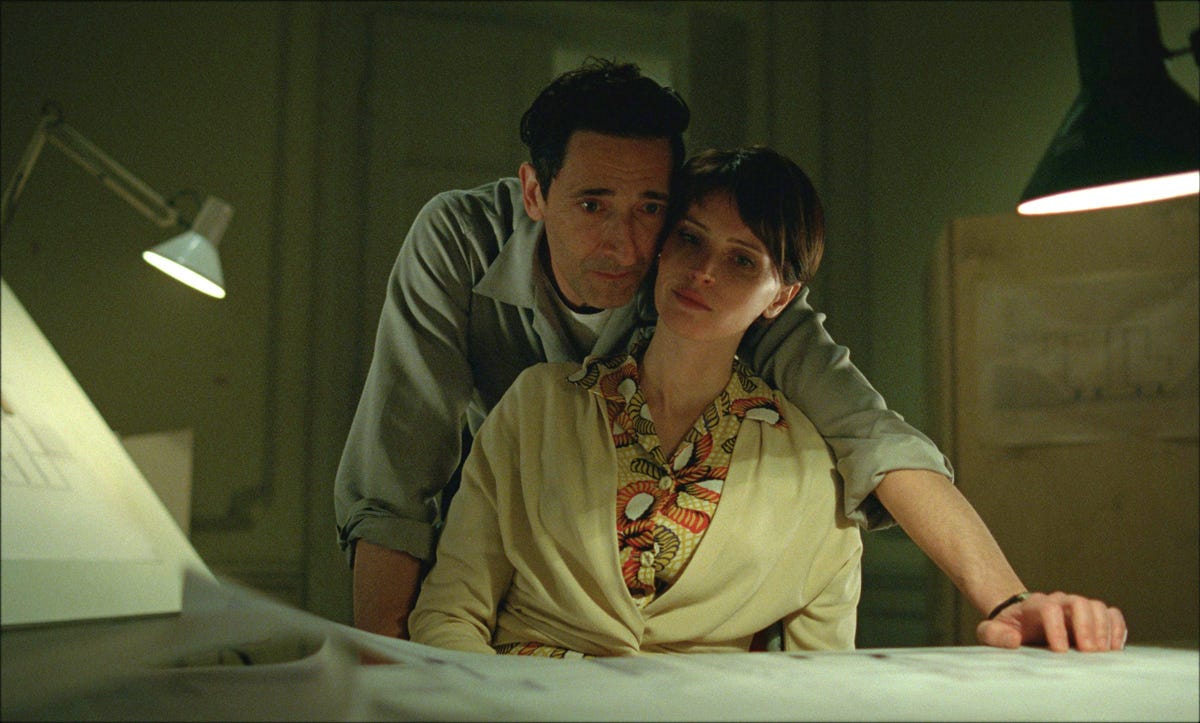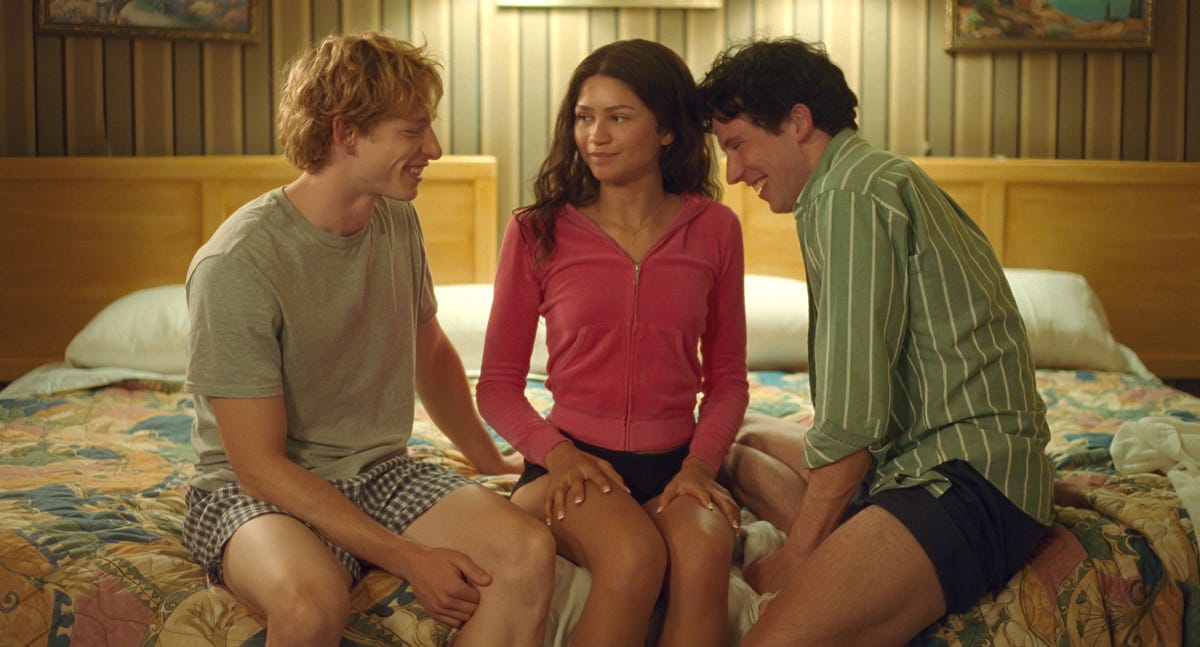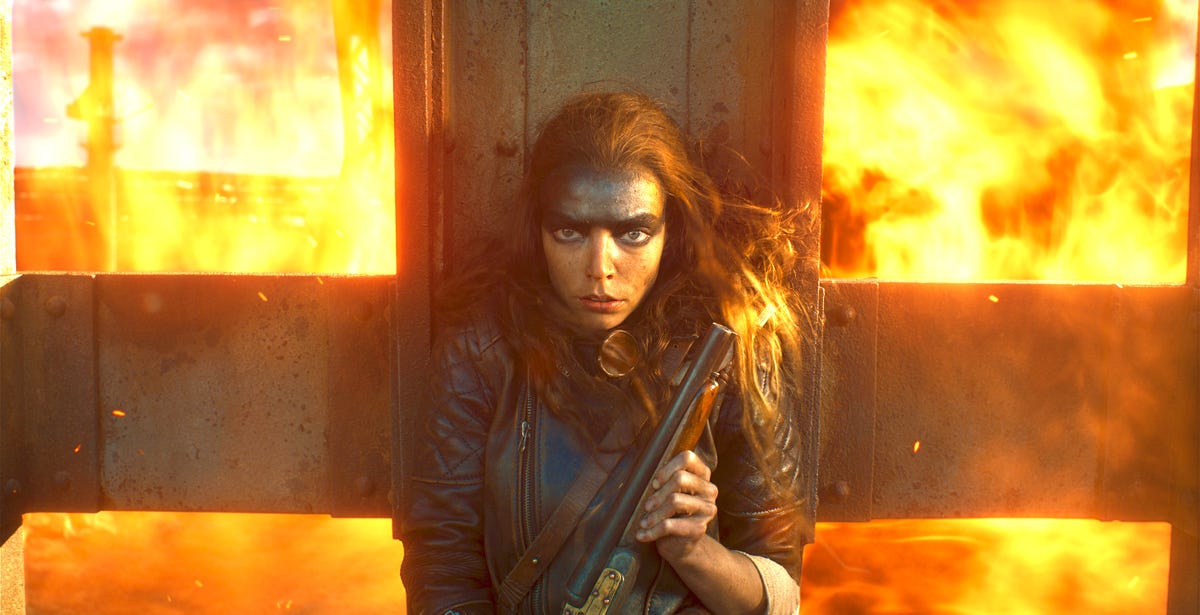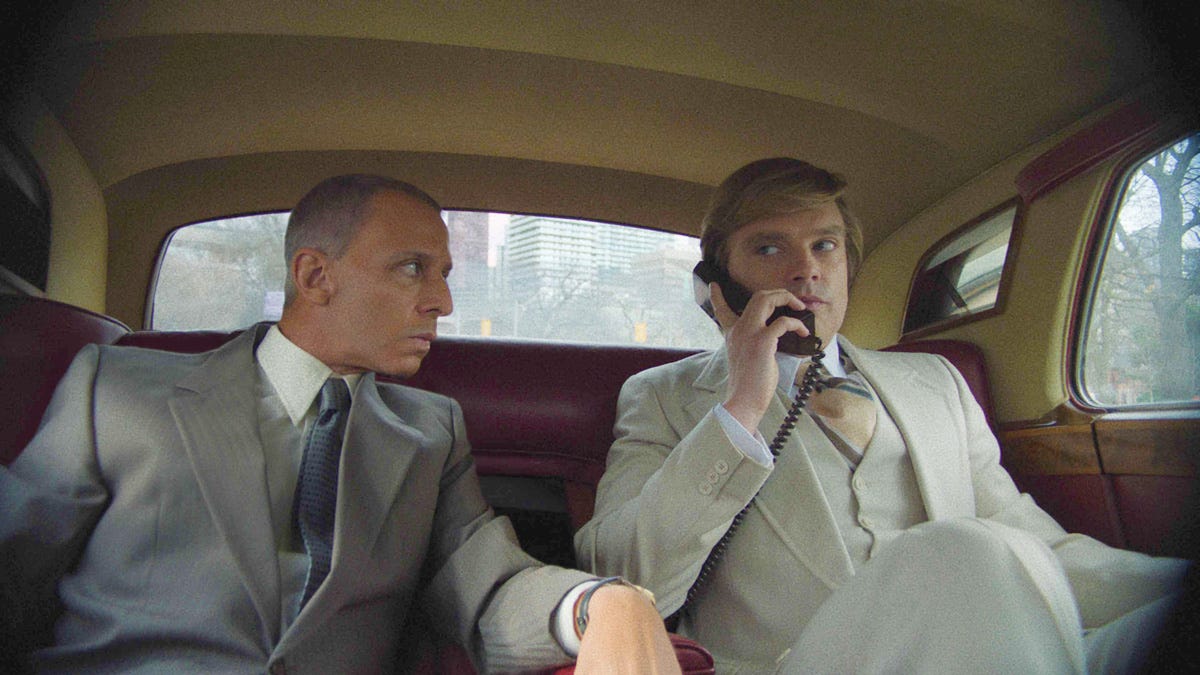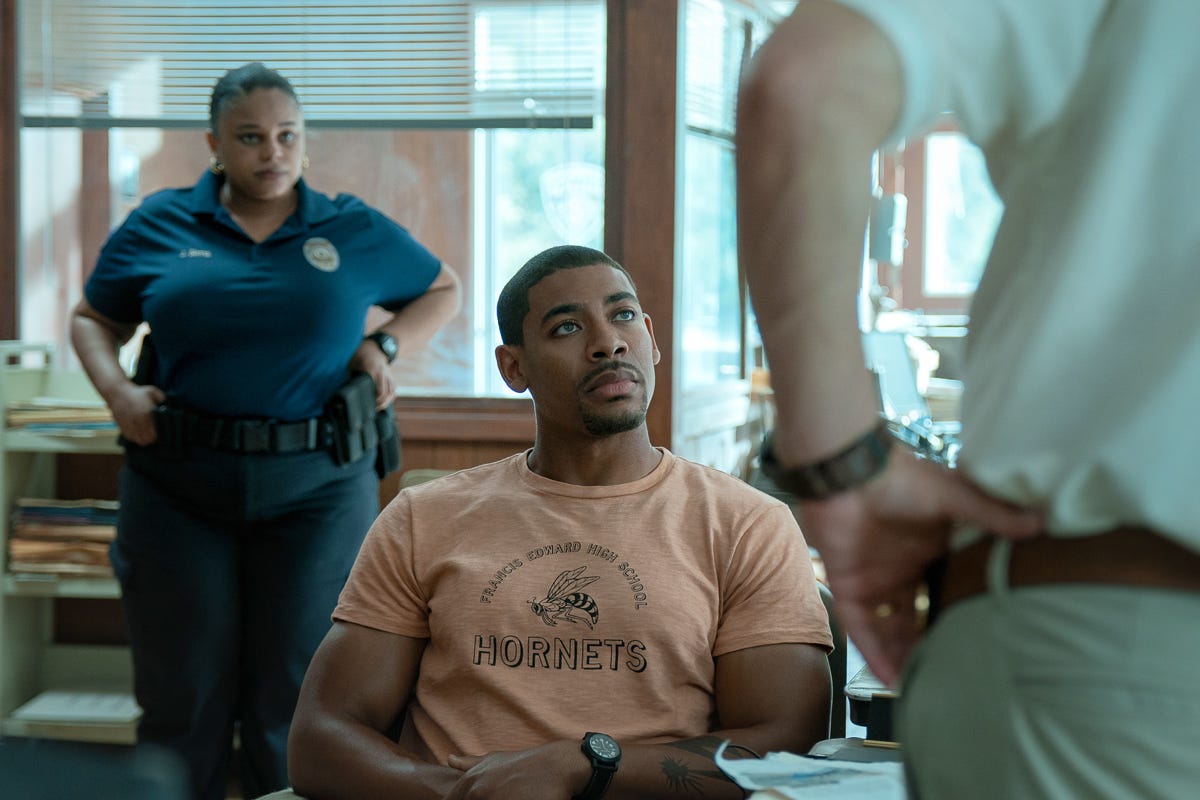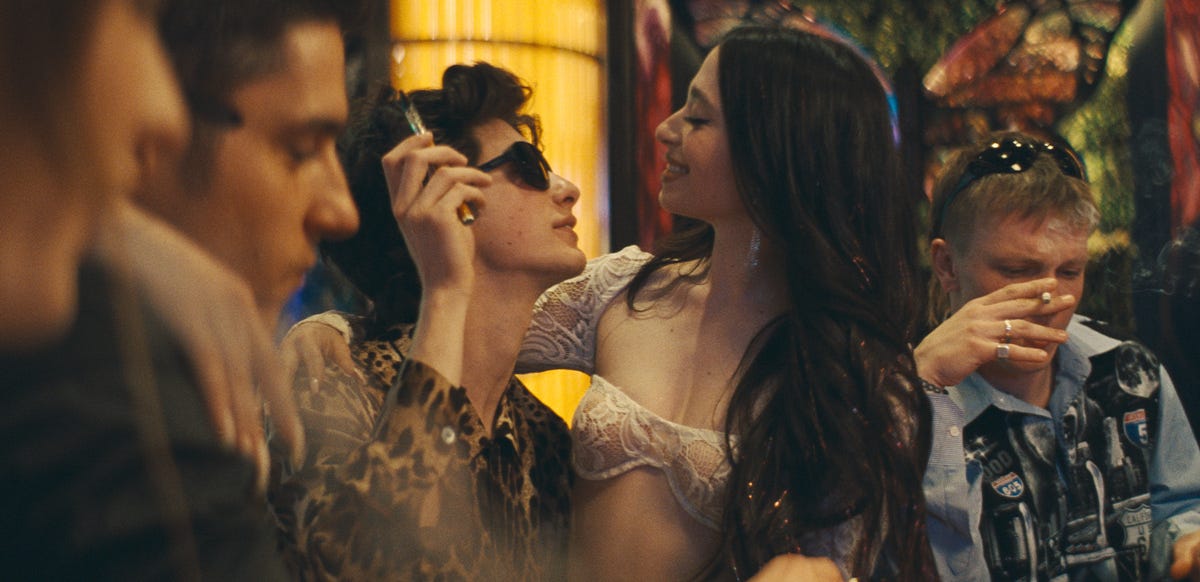Welcome to The #Content Report, a newsletter by Vince Mancini. I’ve been writing about movies, culture, and food since I started FilmDrunk in 2007. Now I’m delivering it straight to you, with none of the autoplay videos, takeover ads, or chumboxes of the ad-ruined internet. Support my work and help me bring back the cool internet by subscribing, sharing, commenting, and keeping it real.
—
Probably like all culture writers do, I have a bit of a love/hate relationship with the year-end list. That may help explain why I’m posting a best-of-2024 list in February 2025 (also: shut up). One reason is basic logistics. The studios tend to release all their awards hopefuls in the last two months of the year, and just trying to see all of those, let alone sort the actual quality from the hype, takes some time.
There’s also a Dunning-Kruger aspect to list-making, where if you feel super confident about your ranking, it probably isn’t very good. The same way no one who makes a list of the top 100 restaurants in the country/state/city could possibly have been to every single one, or the guy who ranks the top 100 high school tight ends couldn’t possibly have seen and evaluated the girth of all those tight ends, no one has actually seen all of the movies that come out in a given year. And even if someone had, you probably wouldn’t want to hang out with them, let alone put stock in their opinions. We all have to try to find a balance between being an expert and living in the world, and part of that balance is knowing that it’s impossible to see everything.
Likewise, there are a million qualifications as to why no list can truly be definitive — the impossibility of seeing everything, recency bias, the ephemerality of art, blah blah blah — but at a certain point you just have to do your best and put your god damn name on it. That’s the job! Go dig a ditch if you don’t like it!
Okay, it’s possible that you didn’t need to hear all of my self-talk as context for a year-end best-movies list, but if you take one thing from this, let it be that I, Vince Mancini, am the real hero, bravely putting numbers next to movies even when I don’t always feel good about them. I used a proprietary mathematical formula to arrive at all my conclusions, which is why they have been certified 97% more accurate than any other year-end listicles. If you disagree with anything here, bear in mind that I will kick your ass. I’m going to twist you into a pretzel and make you smell your own butt until you oink the alphabet like a good piggy. Clear? Okay, let’s talk movies! I love you!
—
Overrated: (As in, the movie I keep seeing on year-end lists where it doesn’t belong)
Juror #2
Yes, it’s very sad that professional moron David Zaslav ratfucked Clint Eastwood by burying what could be Eastwood’s last film, and I hope Zaslav ends up getting pelted with manure in dog prison. That being said, let’s be real here: Juror #2 is not Unforgiven. It’s an above-average Matlock episode. That’s not a bad thing to be, but in a year with a lot of great movies I don’t think this one is in the conversation. I did enjoy the story about Clint Eastwood loudly eating Cheez-Its during takes. Everyone knows I’m a nacho cheese Bugles man myself, but respect nonetheless.
Underrated: (As in, not quite going to make this list either, but should’ve gotten more love).
Spaceman (original review)
As tired I am of high-profile biopics, it seems I have an almost infinite appetite for sad astronaut movies. Spaceman stars Adam Sandler as a depressed astronaut who discusses his failing marriage with a giant spider and the big joke is that the movie isn’t really a comedy. Adam Sandler, who was always better at dramatic stuff than he got credit for but especially now, speaks to the soul of America’s washed dads. I loved Spaceman. 50% on RottenTomatoes!? You all belong in the Hague.
Wild Card: (Some movies aren’t *good*, by any traditional metrics, but are nonetheless unforgettable)
Madame Web (original review)
When the “expanded universe” era of comic book movies is finally dead and buried, Madame Web should be its epitaph. One of the boys on Chapo Trap House the other day floated Madame Web as one of the defining works of the Biden era, and I couldn’t agree more. This boondoggle, in which no one involved seems to know what they’re doing or why, is as accidentally revealing of corporate America’s id as The Room is of Tommy Wiseau’s. This is a movie that had to change its setting from the latter 90s to 2003 out of respect to some arcane point of continuity in the Spider-Man universe, and they had to achieve this almost entirely in post-production. In one scene, Dakota Johnson fondles the tab on a Pepsi can for almost five full minutes of screen time without opening it. I don’t know if I would call what Dakota Johnson does in this brilliant acting, but I find her spellbinding. Is Madame Web a good movie? No, not even close. But it’s a must-watch, and an experience that I’ll probably never forget.
Honorable Mention
The Order
Jude Law plays a wild-eyed FBI agent tracking neo-Nazi terrorist Bob Mathews (a real guy) played by Nicholas Hoult. Side note: how was Nicholas Hoult in every movie this year? He works harder than Eric Roberts. Jude Law plays a hard-drinking cop on the brink better than anyone, and this underseen thriller played like a poor-man’s Heat set in Idaho.
The Fall Guy (original review)
This stunt-movie-about-making-stunt-movies didn’t stick the landing for me, but I truly fell in love with Ryan Gosling and Emily Blunt falling in love. Watch the first 90 and skip the rest.
A Different Man
Speaking of actors being in everything this year, it’s only by the strength of Sebastian Stan in The Apprentice that everyone isn’t talking about Sebastian Stan in Different Man. He plays a guy with facial deformities who gets cured, only to get outshined by a better version of his previous self (which would’ve made a great vignette in Naomi Klein’s Doppelganger, a great book that I also read this year). I enjoyed The Substance, and appreciated its smarts and ballsiness, but I also felt like the last half was mostly me knowing what was going to happen and waiting for it to play out. Different Man took a similar concept and just kept hitting me with left hooks that I didn’t see coming until the credits rolled. Brilliant watch.
Gladiator II (my review, my post-mortem)
Ridley Scott’s 20-years-later sequel makes some of the most idiotic plot choices of any movie this year (see: my post-mortem) but it was also a visual treat from start to almost-finish (see: my review) that had me thanking the universe for the theatrical experience. Denzel was perfect. I could’ve watched him play that character for two more movies.
Thelma (our podcast review)
I hate patronizing movies about old people being a Kick in the Pants (or possibly A Real Firecracker) and as such, I expected to hate this one. Yet Thelma ended up being both cute and actually funny, mostly in non-patronizing ways. June Squibb actually pulled it off, and add Fred Hechinger to the list of guys who were in everything this year and crushed it every time.
Problemista (original review)
When the RZA from Wu Tang shows up playing the artist boyfriend of Tilda Swinton as a Super Karen in a movie that centers on cryogenic freezing, it naturally gives “trying too hard to be Charlie Kaufman.” That was my take for the first chunk of Problemista (written, directed, and starring Julio Torres). Yet Torres’ heartfelt, earnest riff on capitalism, the immigrant experience, and mortality more than won me over in the end. I’m going to say “didn’t stick the landing” about multiple movies on this list, but Problemista is the opposite, where the ending managed to pull everything together just so. Give Julio Torres more movies, please.
The Brutalist (original review)
There are people who love The Brutalist and people who hate it, and part of me agrees with them both. Brady Corbet’s politics-swapped riff on The Fountainhead (the grandiose architect is a socialist rather than a radical libertarian) is a lot like arthouse Gladiator II, in that it never quite comes together in the end but is such a feast from start to finish that I can forgive it (some). It fell apart after the dinner party confrontation for me, and the ending manages to feel rushed even after three and a half hours. As a friend said, it felt like they spent more time on the intermission graphic than wrapping up a three and a half hour movie. Still, I loved up until that point, which is no small feat. Intermissions? Pretty great, actually. Bring back intermissions! Also, I will take any excuse to repost this Brady Corbet quote:
“There’s a lot of this straight-edge ‘I think most sex scenes shouldn’t be in a movie unless they are purposeful’ and that’s interesting. I feel completely the opposite. I always think that every movie would be better if they fuck for eight minutes as the credits roll.”
Pretending all movies aren’t porn on some level is a disservice to both movies and to porn. This was the central message of Babylon. Brady Corbet gets it.
The Top 10
10. (tie) Kneecap (original review)
I’m sorry for doing a tie, I know that it’s inherently cowardly in a ranking, but I really wanted to see Kneecap on a year-end list. There isn’t much to say about Kneecap beyond that it’s an Irish-Language version of 8 Mile that’s a joy to watch from start to finish, with all the rowdiness, sex, drug use, and vulgarity I love to watch. And yes, I include non-stop anti-English rhetoric as a facet of “rowdiness.” As it should be. I won’t pretend to understand every aspect of Irish politics but this movie made me want to snort an entire spice bag.
10. (tie) Dune: Part Two (original review)
Tell you what, the only thing I like more than Dune Two is dune a number two on your mom! Just kidding. I’m sorry. That was uncalled for. But it’s true, stupid puns are half the fun of Dune movies.
This installment gets much more into bloodlines and ancient prophecy than the first, but it was fun to watch Timmy Chalamet slowly, gradually start to do a heel turn. I mean, I think. I haven’t read the books, don’t spoil it for me. Nonetheless, my appetite for going to the sand worm planet and doing the traditional dance of my people remains unsated.
I have quibbles with this one and it doesn’t feel quite like a full movie, but Denis Villeneuve still does the sci-fi epic better than just about anyone. I think he’s so good at visual majesty, in fact, that people tend to overlook some of his flaws, like shooting the Mexico sequences of Sicario entirely in MAGA-vision. Every conservative movie now has to squeeze in the word “sicario” somewhere, it’s practically required by law.
Anyway, Dune: Part Two. Solid installment of a massive budget sci-fi franchise, and we don’t get many of those these days.
9. Challengers (original review)
No one so proudly, consistently lets his freak flag fly like Luca Guadagnino (even if trying to pronounce his name makes me feel like I’m chewing on my own gums). If there’s a writing lesson in Challengers, it’s to never, ever worry that whatever you’re writing is too obscure or too esoteric for mass consumption. Be weird! Get horny! Lean into it1
Challengers was homoerotic love triangle set in the world of competitive tennis starring a 92-pound actress as a tennis wunderkind and two shaggy rodents as steamy heartthrobs. And all shot like a high-class European porno. It worked! Watching them make eyes at each other and scream at tennis balls was more thrilling than your average war epic. I thought Emilia Perez was stupid fun, but that getting 13 Oscar nominations while this objectively much better movie got none is downright baffling.
The other takeaway from Challengers (whose original script, by Justin Kurizkes deserves as much credit as Guadagnino’s direction) is that the way to make the world of your story feel “big” is to just let it be, not grasping at context or profundity but just giving all the everyday details the consideration they deserve. “Tennis is a relationship,” Zendaya’s character says at one point, and that’s pretty much the whole movie.
As I wrote in my review:
Isn’t that what life is, after all? The little details? If you truly want to enjoy life, maybe don’t spend your time mooning over its meaning or your place in a vast universe and just savor all the weird, wonderful, confounding trivialities. That’s ultimately what Guadagnino and Kuritzkes squeeze out of a peculiar little story about horny tennis kids: the innocence and abiding curiosity of youth.
8. A Real Pain (original review)
A Real Pain is another movie on this list that I got nearly halfway into thinking I wasn’t going to enjoy that ended up knocking me out in the end. Why didn’t I love it at first? Jesse Eisenberg seems to be playing a parody of a Jesse Eisenberg character. He’s uptight, Kieran Culkin is laidback — we get it! The odd couple dynamic feels almost painfully on the nose.
And then, Culkin’s performance (with a big assist from Eisenberg’s script) seemed to grow and deepen with every home run of a line read. “Money is like heroin for boring people” is one that has been pinging around my head ever since I saw it. If I can confess something here, I didn’t realize Jennifer Grey was Jennifer Grey until the credits rolled. But it made sense, because she did a lot with a relatively minor role.
In general, A Real Pain gradually became less an odd couple movie and more a movie about traveling, and the way travel can change your perspective on what “home” means. Every person the two Kaplans meet on their Holocaust tour through Poland seemed to be a different, perfect example of Fight Club’s “single-serving friend” dynamic. The backdrop ended up being important too, but not in any of the hokey ways that I expected.
Will Sharpe, who I kind of hated in White Lotus, was outstanding as the tour guide. The movie would be worth it for Culkin’s performance alone, but A Real Pain ended up capturing the way traveling can feel like something that will change you forever and a passing daydream all at the same time. And it did it all in a tight 90. A movie that gives you something and doesn’t overstay its welcome: it’s hard not to love that.
7. Furiosa (original review)
Speaking of Oscar snubs, where the hell was Furiosa? If you’re going to nominate Dune Two for best picture, surely you can’t forget about Furiosa, which was a similar thing, but better, in my mind. Certainly, I have quibbles. Anya Taylor-Joy was probably miscast (Charlize Theron’s shoes are tough to fill, especially in a movie like this), and I don’t know if I would’ve rather had this in-between prequel (which takes place before Fury Road) than an actual sequel and a continuation of the story in Fury Road. Furiosa focuses more on the top-down, institutional politics of the Wasteland than Fury Road’s view from the ground-level players, which is arguably less interesting.
All that being said, George Miller’s take on this world is so ambitious and grandiose and inspiring in a way that almost no other movies ever are. Movie critic shorthand means we often end up treating the director like the near-omnipotent auteur of ever film, just because it makes movies easier to write about that way. Yet Miller’s approach seems defined by giving his creative collaborators the space to indulge their craziest fantasies. The Mad Max movies feel like them all riffing off each other, getting grander and more elaborate as they go, but all with a shared purpose. People criticize these movies from time to time for being narratively basic, but they’re that way for good reason: the plots are necessarily have to be a little quieter so that you can hear the stories the production design is trying to tell.
Aside from all that, this was a career-best role for Chris Hemsworth that would’ve been Oscar-nominated in any other year. Giving him a giant prosthetic nose for the entire movie is the kind of bold, nearly-idiotic decision that’s actually brilliant that you only really get in Mad Max movies. Watching him chew scenery and spew malapropisms as the ruthless, theatrical, performatively masculine leader of a gang of idiot bikers who have forgotten their people’s history in a parentless society scavenging a ravaged environment was delicious when it wasn’t also a little too real.
6. The Apprentice (original review)
I guess the theme of this list is unexpected surprises, because I truly did not expect to enjoy more media about Donald Trump in 2024. The Apprentice appearing on this list does make a bit more sense when you realize that it came from Ali Abbasi, director of Border, simultaneously one of the grossest and most touching movies I’ve ever seen (and perhaps the only to feature graphic troll sex). The man does wonders with hyperrealistic bodily fluid. Ain’t I Also Full of Mucus? that could be Ali Abbasi’s storytelling mantra.
All of that is on full display in The Apprentice, again starring Sebastian Stan, which tells the story of Donald Trump’s evolution from an insecure heirling to shark-eyed, sociopathic self-promoter. The film traces this transformation to Trump’s mentorship from the “almost reptilian” red scare fixer Roy Cohn, played by Jeremy Strong. Both Strong and Stan got nominated for Oscars (and Strong would be a lock in weaker year), deservedly so.
As the (great) book Lucky Loser tells it, Cohn wasn’t nearly so pivotal to Trump’s persona as The Apprentice depicts it (with script by Gabriel Sherman), but in this case the emotional truth is arguably more interesting than the facts. It makes for better cinema, at least. The Apprentice is both a more effective body horror than The Substance and the best “New York Grime” movie not directed by Abel Ferrara or the Safdie Brothers. As I wrote in my review, it’s a film about how a disgusting man became the troll king of a gross city, in all its nauseating glory.
5. Rebel Ridge (original review)
I’ll shut up about the Oscars eventually, I promise, but truly, what does Jeremy Saulnier have to do to get awards voters to notice him? It’s tempting to say “make movies that don’t go straight to Netflix” like Rebel Ridge did, but that didn’t seem to hurt Emilia Perez, of all movies. Of course, Emilia Perez is a Spanish language musical about a Mexican drug lord getting a sex change directed by a Frenchman, so probably the answer is more like “start making white elephants instead of genre thrillers.” Maybe consider a biographical coming-of-age musical set against the backdrop of the Holocaust? Call me, Jeremy, I have ideas.
Anyway, for anyone paying attention, Rebel Ridge was the beau ideal of a smaller-budgeted action movie. Where so many directors think of action in terms of stunts or production values or choreography, Saulnier’s focus seems to be on suspense and tension. Cross-cutting between Aaron Pierre’s character being ordered to the ground at gunpoint and the female deputy learning that he was some kind of martial arts master through Google was a master class — not only in what it takes to properly set up an action sequence, but also that action can be suspenseful and funny. (And by that I don’t meant a lazy spy movie that also has jokes, which Netflix releases one of every two weeks. That shit sucks, please stop.).
Oh, and hey: Aaron Pierre. Rebel Ridge famously had John Boyega originally attached to star, and while I’ve never disliked a John Boyega performance, I have a hard time imagining Rebel Ridge working so well with anyone but Pierre. He has a physicality and quiet menace that’s hard to find in many actors (even despite being objectively pretty). The supporting cast is also first class, from David Denham (Office Guy) and Don Johnson in his ideal role to Emory Cohen, who kills it in pretty much everything. Hard to think of another guy who could manage Cohen’s range just between Place Beyond the Pines and Brooklyn. Here he does sort of a Reluctant Boss Hogg Henchman which isn’t a thing I can remember ever seeing anywhere else.
I originally called Rebel Ridge the First Blood of Civil Asset Forfeiture, which mostly covers it, but I also think the Rebel Ridge scene people most questioned actually might be its strongest. SPOILER ALERT for the next couple paragraphs…
A read a lot of people saying Rebel Ridge’s ending felt unearned, or that the other cops turned on Don Johnson’s character too quickly. For me that was actually a noteworthy and prescient comment on authority and authoritarianism generally. The odds of going against a tyrant always seem steep in light of the forces they tend to command, but those forces are always a little bit of an illusion: lots of people who suck on the teat of power are only doing so out of self-preservation — because it seems like the safest, easiest decision in that moment. Even when they persist for decades, once enough cracks start to appear, those systems start to crumble quickly, as the people who were only toadying because it was easy suddenly find a new easy thing. Sure, a handful of Hitler’s buddies died with him in that bunker, but there were way more trying to double cross each other as fast as they could to try to make deals once they saw the writing on the wall.
You see this with people like Harvey Weinstein or Diddy, watching their influence collapse seemingly all at once, left wondering “Hey, where’d all my friends go?”
They went looking for a new jefe! That’s what toadies do! Doing corruption isn’t for the sentimental. Anyway, that’s what I think was happening in that last scene, and I liked it.
4. Anora (original review)
Sean Baker makes movies where I have to Google the people afterwards to see if they’re actors. They feel that real.
Baker didn’t pluck anyone out of obscurity or career purgatory like he did with his leads in Red Rocket — Yura Borisov and Mark Eydelshteyn were already acclaimed actors in Russia, and Mikey Madison was in the last Scream — but all these characters still managed to feel like they had lives outside of this movie. As if we just happened to be lucky enough to get to spy on them for a few hours.
Per the Vegas odds, Demi Moore is still a thin favorite over Madison in the best actress race (-165 to +200) but my vote would go to Madison. The Substance was great for Demi Moore, but if we take the career appreciation aspect out of it (which almost always affects the results) Madison seems like an easy choice. (I mean selfishly I actually want Karla Sofía Gascón to win, just to see the first Oscar’s acceptance speech in which the winner apologizes for accidentally praising Hitler).
If Red Rocket was the sex worker A Star is Born, Anora is the sex worker Pretty Woman, or at least, the more brutally realistic Pretty Woman. And the brutal realism doesn’t keep it from also being really funny, which was also true of Red Rocket. Being a story about sex workers also means the reaction to Anora would inevitably become polarized along the lines of whether it was pro-sex worker, anti-sex worker, an unfair depiction of sex workers, or blah blah blah. I tend to think a lot of the complaints about Anora are a sort of concern trolling from people who felt cheated when they didn’t get a happy ending. Who then couched that reaction in a sort of pedantry about what depictions of sex workers are and aren’t allowed.
So it goes, I guess, but I thought Anora’s ending was ambiguous in an earned way, kind of sad but also not tragedy porn. It made it harder to reduce, allowing for some interpretation in the way good art can do. Certainly it was true enough to all the characters. Extra points for pissing people off, I say.

